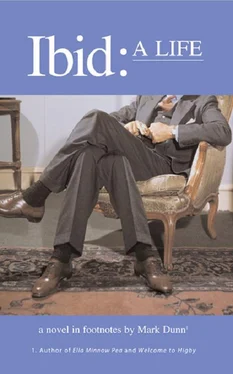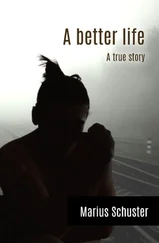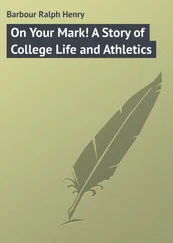When they are all gone, Mr. Bill, what will you do? What will you do then, I wonder?
Your friend,
Jonathan Blashette.
(PS. I am eleven and I have three legs. And I wish that you would go to Florida and kill alligators for a change.) JBP.
11. Jonathan knew the moment he met Mr. Grund that his life was about to change forever.In Cordell Glover’s monumentally flawed, indolently under-researched, and offensively over-embroidered biography of Blashette, Three Legs, One Heart: The Story of Jonathan Blashette, (Fairhope, Alabama: Hollon House, 1989) — from which I have drawn sparingly and only when other sources are in full corroboration — the biographeraster provides us with a ludicrously contrived, yet too deliciously accoutered description of the arrival of Thaddeus Grund to the town of Pettiville that pivotal autumn afternoon of 1900 for me not to include at least a paragraph or two for your amusement:
“The train was late. Oh it was late all right, and everybody knew it. The crowd that had gathered at the station shifted from leg to leg, in one great concerted sway of impatience, like an enormous beast with many heads and twice as many legs hungry — hungry for what? — the beast only knew this: that a banquet awaited one of their number. The young twelve-year-old, the one they called “Jonathan” or “Triple Threat” or “Spare Shoe.” And the beast sniffed. Sniffed and snorted loud and without apology. They could all smell it; the pungent odor of fate, of a destiny materializing. Grund was Pettiville-bound and bearing a wheelbarrow full of cash. And they smelled the cash, the people did, with nostrils opened and stretched clean and wide by the sweet perfume of fame and fortune. The boy was brought to the edge of the platform, held aloft, as a distant whistle announced the iron horse’s arrival. As the steam folded back like a great wet curtain and the locomotive pushed through, chug-a-chugging into the Pettiville station, the crowd itself whistled and tooted and tossed the boy high into the air, ready to deliver him to a future of assured acclaim. The tracks sang out and the men and the women and the little ones with two legs, each sang out as well. The train slowed and stopped, and the man who would mold young Jonathan’s future like a potter of brash fate, with muscular, knowing hands, stepped down from the train and smiled and tousled the boy’s dusty brown hair. And a cheer went up. And tears flowed down the excitement-rubied cheeks of Addicus and Emmaline Blashette. Tears of loss, for, yes, the child would be taken from them within hours, but tears, yes, also of joy for what the future might hold for this most special child. And the crowd parted and made way for Addicus and Emmaline and Jonathan and their evening guest, the spangled showman Thaddeus Grund, to climb into the festooned barouche that would transport the foursome to the Blashette farm. To talk of a future bright, of a destiny held in the hand and grasped firmly and kissed and sniffed and stroked with tender anticipation .
It was a night the boy would always remember.”
The train, in fact, wasn’t late. It was on time. And no one had gathered on the platform but Addicus and his farmhand Bill Boils. Jonathan was off picking apples for a “last meal” lattice pie. To be sure, Addicus was aware that Thaddeus Grund’s Traveling Circus and Wild West Show was popular and successful, and might provide ample income for the struggling Blashettes, but Emmaline’s resistance had diminished the ebullience of the welcome. The three men rode back to the Blashette farm in a rickety buckboard, in funereal silence. Emmaline wasn’t even around when her husband and his showman guest arrived. She had ventured off to Inspiration Creek where she wept in protected solitude for the future of her special child.
1. “Hello Mr. Diary.”Biographers of Jonathan Blashette are indebted to their subject for a couple of reasons. From the first week of his employment with the Grund Circus, Jonathan put down his thoughts and impressions and a detailed listing of each day’s activities in a diary — a habit to which he would hold for the rest of his life. We are indebted to Jonathan, as well, for carefully maintaining this collection of diaries, and for entrusting them to the perpetual custody of the Pettiville Library and Interpretive Center to which he also bequeathed the rest of his voluminous papers and many of his personal effects. This institution offers researchers unrestricted access and extensive assistance, including, even, a daily refreshment hour of tea and “biscuits,” and the occasional neck massage.
In a bizarre sense, it is almost as if Jonathan anticipated me in particular. It was as if he knew of my special affinity for Mint Milanos and Malawi tea, and the fact that I can always do with a good neck rub.
In a codicil to his will Jonathan writes:
“I have few secrets. Most who know me know this. I should be flattered if some future researcher or biographer found this life important enough to write about. I know that it was an odd one, to be sure. But then isn’t each life unique in its own way? Delve if you wish into the eclectica of my existence on this planet and marvel at the incongruities, as I myself have marveled over them. That a country boy with three legs would grow up to hobnob with nabobs alongside “jest plain bobs” and girls who bob their hair, and guys named Harry and hairy French guys named Guy, and I better stop here before my heirs begin to question the compos of my mentis!
Welcome all comers! Friend and enemy alike. Turn my pages all you wish, for I am and have always been an open book.
Life has treated me well — a life which I have always shared with others, and which I now share with you, bob and nabob alike.”
These words were obviously penned prior to Jonathan’s descent into the depths of gut-wrenching late-life reassessment. All tellers of the story of Jonathan Blashette are grateful that their subject postponed this intense self-examination until after his papers were donated to the Pettiville Library and Interpretive Center. Had he waited, it is entirely possible that he might have burned them all. (Final additions were made by Jonathan’s son Addicus Andrew after his father’s death.)
Incidentally, we are blessed with a nearly complete run of Jonathan’s diaries with the exception of the years 1917 and 1918, both of these volumes having been lost in France during Blashette’s tour of duty with the American Expeditionary Force. (This lacuna is bridged by correspondence and the journals of Jonathan’s contemporaries.) Seldom has a subject left such a rich reservoir of source material from which to draw.
2. “The train whistle lulled me to sleep.”Jonathan’s Diary, 6 September 1900, JBP.
3. “I have yet to make any friends.”Ibid., 8 September 1900.
4. “I am sorely homesick.”Ibid., 9 September 1900.
5. “I am alone in my trailer but tomorrow another boy will join me.”Ibid., 10 September 1900.
6. “I have met a boy who wishes to be my friend. My spirits have risen.”Ibid., 11 September 1900. Thaddeus Grund in his celebrated autobiography, Ringleader: A Life in Circus Management, with a Foreword by the Bastard Ringling Brother “Skippy” (Sarasota: Three Ring Press, 1921), notes that young Jonathan “took some time to warm to carnival life” but agrees that meeting Toby-the-Monkey-Boy Brancato was a positive development. This early difficult period of adjustment was due in no small part to the cold reception Jonathan received from the other sideshow performers who were often slow in welcoming newcomers into the fold.
Читать дальше












